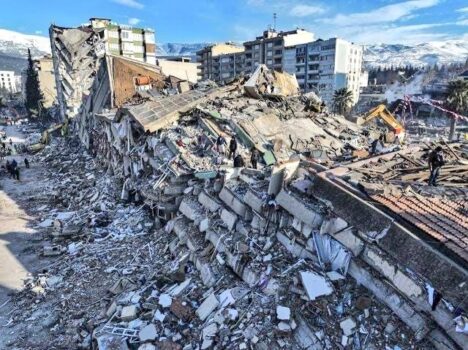 The Israeli military has announced it is sending additional troops into southern Lebanon to confront the militant group Hezbollah. The move comes after Iran launched nearly 200 missiles at Israel on Tuesday night, prompting Israel to vow a “painful” response to the attack.
The Israeli military has announced it is sending additional troops into southern Lebanon to confront the militant group Hezbollah. The move comes after Iran launched nearly 200 missiles at Israel on Tuesday night, prompting Israel to vow a “painful” response to the attack.
Israeli officials have confirmed the deployment of more soldiers and an armored tank brigade to assist in what has been described as a “limited, localized” ground offensive against Hezbollah, the Iran-backed militia group. The military also issued warnings to residents in 24 villages in southern Lebanon, urging them to evacuate immediately for their safety. “You must leave your homes immediately,” said Avichay Adraee, the Israeli military’s Arabic spokesperson, adding that any civilian near Hezbollah fighters, facilities, or weapons would be at risk. Evacuation orders instructed residents to move north of the Awali River, around 30 miles from the Israeli-Lebanon border.
Earlier Wednesday, sirens sounded across northern Israel after approximately 100 rockets were fired from Lebanon. Alerts were issued in communities near the port city of Haifa and Western Galilee, both close to the Lebanese border. The Israeli military announced that a soldier was killed in combat in Lebanon, while Hezbollah claimed responsibility for killing and wounding an unspecified number of Israeli troops.
Two weeks of ongoing Israeli strikes across Lebanon have resulted in more than 1,030 deaths, including 87 children, according to Lebanon’s Health Ministry.
Tuesday night saw a significant escalation when Iran fired about 180 ballistic missiles toward Israel. Although the Israeli military intercepted most of the missiles, some landed, causing damage. The only confirmed fatality was a 38-year-old Palestinian man killed in Jericho, located in the Israeli-occupied West Bank. The strike also caused injuries and property damage, with officials in Jordan reporting two people injured by falling shrapnel.
In response, the Pentagon stated that two U.S. destroyers fired a dozen interceptors to counter the missiles headed toward Israel. Tensions in the region are rising as Israel prepares its response, increasing the risk of a broader conflict. Israeli Prime Minister Benjamin Netanyahu described Iran’s actions as a “big mistake” and warned, “It will pay for it.” Rear Admiral Daniel Hagari, an Israeli military spokesperson, referred to the missile attack as “a severe and dangerous escalation,” while Israel’s ambassador to the United Nations, Danny Danon, promised a “decisive and painful” retaliation.
Iran’s missile strike was reportedly in retaliation for a series of targeted killings, including the assassination of Hezbollah’s leader Hassan Nasrallah in Beirut and Hamas leader Ismail Haniyeh in Tehran, both allegedly carried out by Israel. Iran’s Revolutionary Guard described the missile attack as a “legal, rational, and legitimate response to the terrorist acts of the Zionist regime,” according to a statement from Iran’s mission at the United Nations.
As tensions between Israel, Iran, and Hezbollah continue to escalate, the region remains on high alert.

White House Says Military Option Open On Greenland Acquisition
Trump Calls Case Against Maduro “Infallible” Ahead Of U.S. Court Appearance
South Africa Raids U.S. Refugee Processing Centre, Arrests Seven Kenyans
Time Magazine Names AI Visionaries ‘Person of the Year’